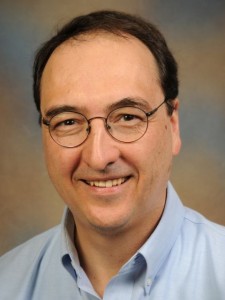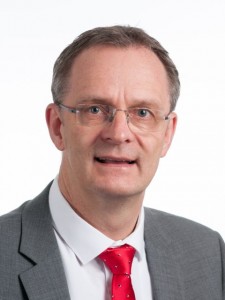Prof. Danica Kragic, Royal Institute of Technology
Title: From autonomous interaction to collaboration: challenges for human-in-the loop systems [Presentation]
Abstract:
For the future, we envision the existence of different types of autonomous systems that perform complex tasks safely and robustly in interaction with humans and the environment. These are relevant for both industrial and domestic applications, indoor and outdoor, supporting humans in everyday tasks. Natural interaction exhibits complex dynamical properties. Dynamics exhibits itself in interaction in many different ways: let us for examples consider our hands. We use hands to dress, eat, write, wash, play games: all of these tasks involve close and complex interaction with objects and the environment, having both complex temporal and structural components. As humans, we can execute them even if one of our hand/arm/fingers is injured or not functioning properly relying on the process of efficient planning and decision making. Although our planning capabilities have developed through a long process of evolution and in many cases depend on training and experience, we are dependent on extracting the necessary information from the environment through our senses and coupling it with our dexterity. Compared to humans or primates, the sensing and dexterity of today’s robotic hands and arms is extremely limited. We can also draw a parallel with prosthetic hands that commonly have a single degree of freedom allowing them to interact with only a limited set of objects. Replicating the effectiveness and flexibility of human hands requires a fundamental rethinking of how to exploit the available mechanical dexterity and potentially suggests new, more efficient designs. To achieve this, we need to integrate several sensory modalities to estimate the state of the environment, understand the requirements of a specific task, and provide reasoning based on the available kinematic and dynamic properties for planning and acting in uncertain, dynamic environments. In this talk, we review our work in the area that ranges from mathematical and statistical modeling to signal processing and data mining.
Biography:
Danica Kragic is a Professor at the School of Computer Science and Communication at the Royal Institute of Technology, KTH. She received MSc in Mechanical Engineering from the Technical University of Rijeka, Croatia in 1995 and PhD in Computer Science from KTH in 2001. She has been a visiting researcher at Columbia University, Johns Hopkins University and INRIA Rennes. She is the Director of the Centre for Autonomous Systems. Danica received the 2007 IEEE Robotics and Automation Society Early Academic Career Award. She is a member of the Royal Swedish Academy of Sciences and Young Academy of Sweden. She holds a Honorary Doctorate from the Lappeenranta University of Technology. She chaired IEEE RAS Technical Committee on Computer and Robot Vision and served as an IEEE RAS AdCom member. Her research is in the area of robotics, computer vision and machine learning. In 2012, she received an ERC Starting Grant. Her research is supported by the EU, Knut and Alice Wallenberg Foundation, Swedish Foundation for Strategic Research and Swedish Research Council. She is the General Chair for IEEE International Conference on Robotics and Automation, 2016.
Prof. Richard Murray, California Institute of Technology
Title: Specification and synthesis of networked control systems with application to autonomous vehicles [Presentation]
Abstract:
Design of modern control systems involves the analysis and synthesis of feedback controllers at multiple levels of abstraction, from fast feedback loops around actuators and subsystems, to higher level decision-making logic in supervisory controllers and autonomous systems. One of the major challenges in design of complex networked control systems — such as those arising in aerospace, computing, robotics, critical infrastructure and manufacturing systems, to name a few — is insuring that the combination of dynamical behavior and logical decision-making satisfy detailed safety and performance specifications. In many of these areas, verification and validation are now dominant drivers of schedule and cost, and the tools available for design of such systems are falling behind the needs of systems and control engineers, particularly in the area of systematic design of the mixed continuous and discrete control laws for networked systems.
This talk focuses on work over the last 10 years by a variety of groups interested in rigorous specification and systematic synthesis of decision-making logic for hybrid systems, with an emphasis on applications in autonomy. Decision-making logic in these systems is responsible for selecting modes of operation for the underlying (continuous) control system, reacting to external events and failures in the system, and insuring that the overall control system is satisfying safety and performance specifications. Tools from computer science, such as model-checking and logic synthesis, provide new approaches to solving these problems. A major shift is the move from “design then verify” to “specify then synthesize” approaches to controller design that allow simultaneous synthesis of high-performance, robust control laws and correct-by-construction decision-making logic. This talk will provide an overview of the relevant theory and recent results with application to autonomous vehicles.
Biography:
Richard M. Murray received the B.S. degree in Electrical Engineering from California Institute of Technology in 1985 and the M.S. and Ph.D. degrees in Electrical Engineering and Computer Sciences from the University of California, Berkeley, in 1988 and 1991, respectively. He is currently the Thomas E. and Doris Everhart Professor of Control and Dynamical Systems and Bioengineering at Caltech. Murray’s research is in the application of feedback and control to networked systems, with applications in autonomy and synthetic biology. Current projects include specification, verification and synthesis of networked control systems; analysis and design biomolecular feedback circuits; and novel architectures for control using slow computing.
Prof. Alf J. Isaksson, ABB AB, Corporate Research
Title: A perspective on the Internet of Things, Services and People – in the context of Sustainability and Optimization [Presentation]
Abstract:
The notion of Internet of Things, as well as related topics like Cyber-Physical Systems, is currently attracting quite a lot of attention also in manufacturing and process industries. As a major supplier of automation systems to these industries, ABB has long been at the forefront of technology that connects devices to each other, helping lead the revolution that began with the Intranet of Things. Having the communication in place, the next challenge is to determine what services to offer using this infrastructure. Hence, the paradigm shifts to the Internet of Things and Services, as ABB increase our offering including remote monitoring of energy installations and condition-based maintenance for mining and other industrial equipment.
We now stand at the brink of the next evolution, to the Internet of Things, Services and People, or the IoTSP, where technology is enhancing the role people play in the world of power and automation by giving them powerful new decision-making tools that will result in lower costs and higher profits for our customers. Clearly IoTSP offers many potential applications for automation, ranging from how to engineer the installation of new plants to production management and maintenance. This talk will give examples of such applications, with particular focus on sustainability in terms of energy efficiency and how IoTSP can be utilized for (cloud-based) optimization solutions.
Biography:
Alf Isaksson received his MSc and PhD from Linköping University, Sweden in 1983 and 1988 respectively. After graduating he stayed at Linköping University until 1991 as an Assistant Professor. From 1991 to 1992 he spent one year as a Research Associate at The University of Newcastle, Australia. Returning to Sweden in 1992 he moved to the Royal Institute of Technology (KTH) in Stockholm, where eventually in 1999 he was promoted to full Professor. In 2001 he made the shift from academic to industrial research and joined ABB Corporate Research in Västerås, Sweden. After a specialist career culminating in an appointment to Corporate Research Fellow 2009, he is now since January 2014 Global Research Area Manager with the responsibility of internally funding all research in Control at all ABB’s research centers world-wide. At the same time he still keeps a connection to the academic world as Adjunct Professor at Linköping University since 2006.








